 Petzlover
Petzlover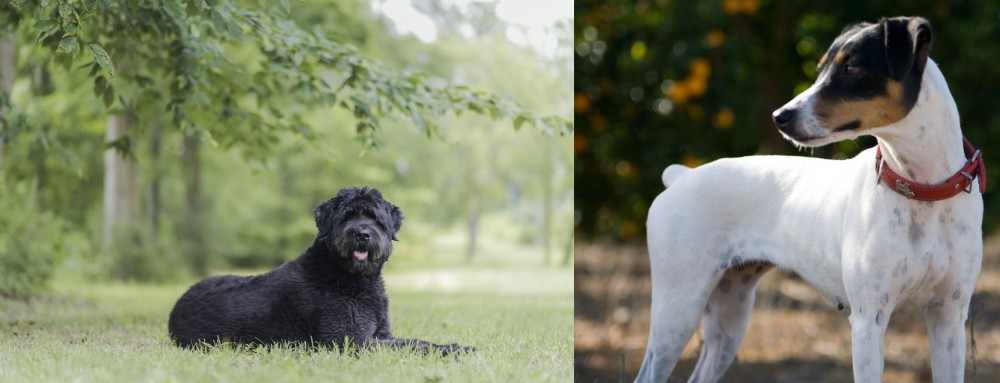 Bouvier des Flandres is originated from Belgium but Ratonero Bodeguero Andaluz is originated from Spain. Bouvier des Flandres may grow 27 cm / 11 inches higher than Ratonero Bodeguero Andaluz. Bouvier des Flandres may weigh 43 kg / 95 pounds more than Ratonero Bodeguero Andaluz. Bouvier des Flandres may live 6 years less than Ratonero Bodeguero Andaluz. Bouvier des Flandres may have more litter size than Ratonero Bodeguero Andaluz. Bouvier des Flandres requires Moderate Maintenance. But Ratonero Bodeguero Andaluz requires Low Maintenance
Bouvier des Flandres is originated from Belgium but Ratonero Bodeguero Andaluz is originated from Spain. Bouvier des Flandres may grow 27 cm / 11 inches higher than Ratonero Bodeguero Andaluz. Bouvier des Flandres may weigh 43 kg / 95 pounds more than Ratonero Bodeguero Andaluz. Bouvier des Flandres may live 6 years less than Ratonero Bodeguero Andaluz. Bouvier des Flandres may have more litter size than Ratonero Bodeguero Andaluz. Bouvier des Flandres requires Moderate Maintenance. But Ratonero Bodeguero Andaluz requires Low Maintenance
 These large dogs have descended from Flemish cattle dogs, and in French, the word Bouvier means herdsman or cattle herder. This is because the dog was used for driving cattle. The Bouvier comes from the Flemish region of Belgium where it was bred as a working farm dog. It is believed that the breed may have come from crossing local farm dogs with imported Irish Wolfhounds, Schnauzers, Tibetan Mastiffs, Brabanters, Griffons and Beaucerons.
These large dogs have descended from Flemish cattle dogs, and in French, the word Bouvier means herdsman or cattle herder. This is because the dog was used for driving cattle. The Bouvier comes from the Flemish region of Belgium where it was bred as a working farm dog. It is believed that the breed may have come from crossing local farm dogs with imported Irish Wolfhounds, Schnauzers, Tibetan Mastiffs, Brabanters, Griffons and Beaucerons.
It was in 1910 that the first Bouviers appeared at the international dog show in Brussels, with a standard for the breed being adopted in 1912.The American Kennel Club recognized the dog in 1929. It was after World War 11 that Bouviers were brought to America and the American Bouvier des Flandres Club was founded in 1963.
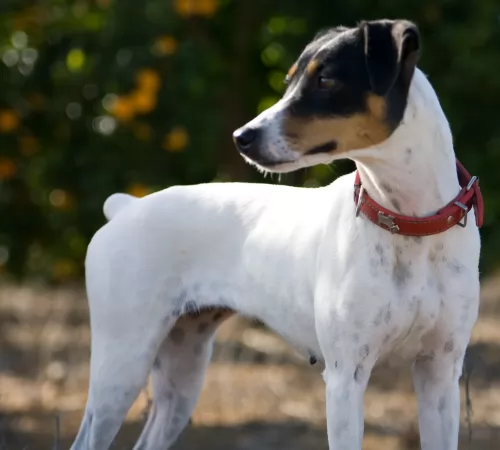 Long ago the English visited Spain to sample their wines, bringing with them smooth coated English Fox Terriers which were later crossed with other dog breeds of the area.
Long ago the English visited Spain to sample their wines, bringing with them smooth coated English Fox Terriers which were later crossed with other dog breeds of the area.
It is believed that the Andalusia Ratter’s ancestors were smooth coated fox terriers. The Club Nacional del Perro Andaluz Ratonero Bodeguero was established and in 1993 a standard for the breed was set.
It is only fairly recently that the breed was recognized by the Royal Canine Society of Spain but it isn’t recognized by any of the major kennel clubs.
 The Bouvier is a large compact, well built dog with strong muscled limbs. He stands at roughly 59 to 70 cm high at the withers, weighing between 27 and 52 kg. He has a large head with a thick and abundant coat which is of rough appearance. The coat is mostly black, but you’ll also find a range of other shades such as brindle, grey and fawn.
The Bouvier is a large compact, well built dog with strong muscled limbs. He stands at roughly 59 to 70 cm high at the withers, weighing between 27 and 52 kg. He has a large head with a thick and abundant coat which is of rough appearance. The coat is mostly black, but you’ll also find a range of other shades such as brindle, grey and fawn.
The back of the dog is level and broad, and is typically wider in female dogs. The back legs are strong and muscular. Some Bouvier des Flandres are born tail-less and this is most attractive. Most Bouvier dog owners used to have the tails docked because of the excellent appearance, but with docking now being banned, the tail is kept long. The muzzle is wide, the nose large, the eyes dark brown and the ears high set and floppy.
The Bouvier is intelligent, energetic and full of confidence while being calm and balanced in temperament. The puppies are vocal and full of antics, but as the Bouvier grows into adulthood, he mellows and becomes a steady family friend who gets on well with each human family member. He loves spending time with his family and becomes both friend and guardian, making a good watchdog too.
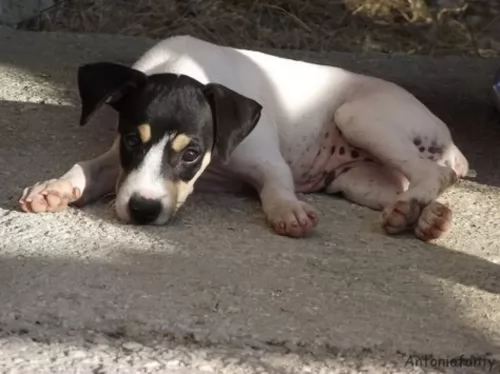 Also known as the Spanish Jack Russell, the Ratonero Bodeguero Andaluz looks very similar to this popular Jack Russell Terrier.
Also known as the Spanish Jack Russell, the Ratonero Bodeguero Andaluz looks very similar to this popular Jack Russell Terrier.
He is a small to medium sized dog with a lean, muscular body. The Ratonero developed in the south of Spain and is thought to be a mix of local ratting dogs and Fox Terriers. This ensured a quick, agile hunter.
The dog stands at between 35 – 43cm in height and weighs 6 - 9kg. The dog’s head is fairly small with dark brown eyes and half erect-half floppy ears. The coat is mainly white with some freckling. It is short and smooth with shades of black and tan covering the facial area. Some of these dogs are born with a natural bob-tail.
These dogs are known to have robust, hearty, happy personalities, full of the joys of living. They get on well with children as well as other pets if they have grown up with them.
Introductions should be slow if one of these dogs are brought into a home where there are already other pets. He is a very active breed and will be requiring plenty of mental stimulation and physical exercise.
They can provide quite a bit of entertainment for their human families as they can become quite clownish. They’re the kind of dogs that can adapt to life in the countryside or the city.
 The Bouvier is such an amicable dog and strong and energetic too. He makes the most marvellous companion and will happily adapt to life in the city or in the country, although, with his big size, he is better suited to a home where there is enough space to run around in.
The Bouvier is such an amicable dog and strong and energetic too. He makes the most marvellous companion and will happily adapt to life in the city or in the country, although, with his big size, he is better suited to a home where there is enough space to run around in.
He is loyal, loving and protective and when you make sure to make him an active part of your family, you’ll find in him all the characteristics of a true friend.
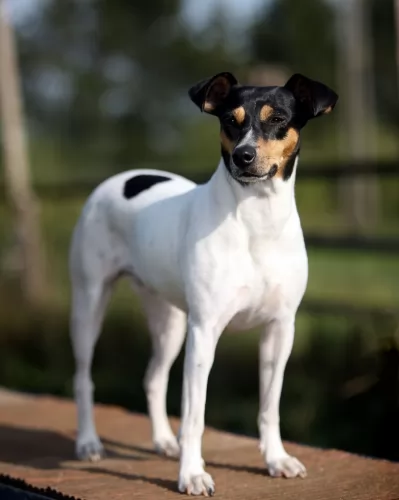 Your Ratonero Bodeguero Andaluz to this day is a ratter, always alert and ready to spring on prey. He is always lively and friendly, and with his loving nature, makes a splendid companion for his human family.
Your Ratonero Bodeguero Andaluz to this day is a ratter, always alert and ready to spring on prey. He is always lively and friendly, and with his loving nature, makes a splendid companion for his human family.
He is also a stubborn dog, liking to go his own way, and therefore will require training and socialization. He is an adaptable little dog too and when you bring him into your home he is willing to adapt to your way of life and become a loyal and loving member of your family.
 The big teddy-bear of a dog is a healthy breed, but as a large dog, you will need to look out for certain health problems with him.
The big teddy-bear of a dog is a healthy breed, but as a large dog, you will need to look out for certain health problems with him.
Xrays have been done on many Bouvier des Flandres by the Club and by the Orthopedic Foundation of America and it has been found that a significant percentage of Bouviers were dysplastic. Hip dysplasia is a deformity of the hip joint and many large breed dogs battle with this. It can be very sad for dog lovers as they watch their dog battling to get up after lying down and sometimes lameness in the hind legs.
Dental disease is a common problem in many dogs, and the Bouvier isn’t excluded one bit. If you don’t brush your pet’s teeth with special dog toothpaste and toothbrush, there is tartar build-up which can lead to bad breath and gum infection. Dental disease can lead to pain in the teeth and even the loss of teeth. Bad teeth affect the entire body, and the heart, kidneys and joints can all be negatively affected.
The Bouvier is a large dog prone to obesity. This is a serious disease that can lead to all kinds of digestive disorders, back pain as well as heart disease. It can be easy just to give in to your pet’s pleading eyes, but in the long run, excessive weight can spell a host of health problems.
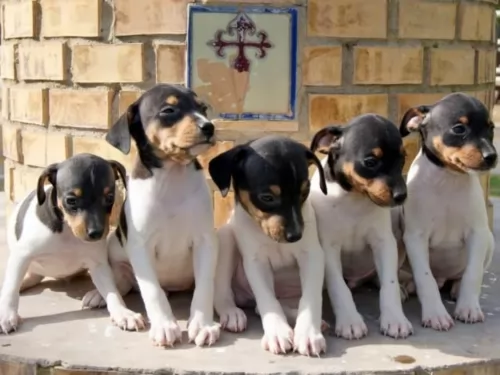 With good care, your Andalusian Ratter isn’t likely to get sick, but still, you would be better off knowing about some of the common dog diseases your pet could get.
With good care, your Andalusian Ratter isn’t likely to get sick, but still, you would be better off knowing about some of the common dog diseases your pet could get.
This is usually seen in young dogs where there is lameness in the hind legs and hip pain. It is believed that Legge Perthe’s occurs because of a genetic predisposition, and when it develops, there is sadly no cure.
Skin infections may seem fairly mild but nothing can be further from the truth. They can be painful and frustrating. Skin redness, dryness, itchiness and pain can cause your pet to lick and bite and make the situation worse. If your pet is being driven crazy by a skin irritation, get him to the vet who will do a complete physical examination.
Other diseases to be aware of include hip dysplasia, obesity, epilepsy and bloat.
 Your Bouvier is an intelligent, independent dog and you will be doing him a favor by having him socialized and trained. He becomes such a pleasure to have around, being obedient and willing to respond to your commands.
Your Bouvier is an intelligent, independent dog and you will be doing him a favor by having him socialized and trained. He becomes such a pleasure to have around, being obedient and willing to respond to your commands.
Every dog, and particularly large dogs like the Bouvier, should be able to rely on a daily walk, a run in the park or on the farm and have special games from his owner. Not only does participating in activities together build a strong bond between dog and owner, its important to avoid boredom and frustration with your dog. You bought him so you therefore have a responsibility toward him.
Your Bouvier des Flandres has a thick, medium-length coat that gets a shaggy look to it. The breed needs regular brushing every second day or so to get rid of loose hairs and to prevent the hair matting. He will require some professional grooming to look and feel his best. With his thick coat, he is hypoallergenic which can be a relief for allergy sufferers.
The Bouvier has to be on high-quality dog food, whether you give him home-made food or commercially manufactured food. It has to have the right amount of vitamins and minerals. If you’re unsure about feeding a dog, remember that the amount and type of food you give your pet must be appropriate to your dog’s age, size and energy levels.It can also be wise to know which human foods are bad. Speak to your vet about your dog – they are a minefield of useful information about your pet. Fresh, cool water should be be available at all times.
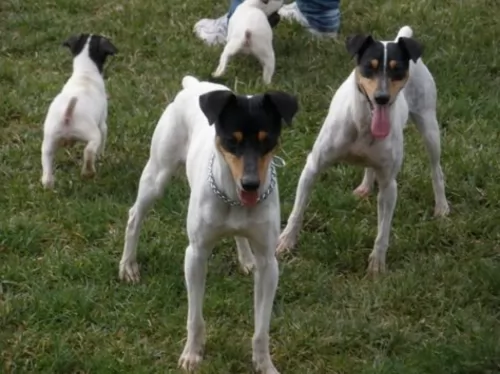 This is a fairly low maintenance dog as the short smooth coat will be easy to brush twice a week.
This is a fairly low maintenance dog as the short smooth coat will be easy to brush twice a week.
Check him over for unusual lumps, trim his nails and check inside his ears, look into his eyes to ensure they are bright and alert and look inside his mouth to make sure he doesn’t have any rotten teeth.
Have your pet neutered or spayed if you want to avoid puppies. This can be beneficial for your pet’s health too.
Feed your Ratonero Bodeguero Andaluz only the best food there is. If you opt for commercially manufactured food, make sure its full of vitamins and minerals. Your little pet will want consistency and simplicity with his food to avoid digestive problems.
Try and provide him with some home-made food which can be added to the dry kibble twice a week as a treat. Boiled chicken, brown rice or pasta and spinach, sweet potatoes and carrots all chopped up ad mixed into the dry kibble will ensure your pet’s health.
Some raw meat added in occasionally will also go towards ensuring his good health.
Always make sure he has access to fresh, cool water.
Provide him with a safe, dry, warm, comfortable place to sleep.
Get him to the vet when you see he is sick.
Ensure he has sun and shade in the garden.
Never ever leave him in a hot car.